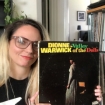Most musicians hate hecklers. Not Shawna Potter, frontwoman of feminist punk posse War On Women: If anything, she pities them. "This one time we were playing in Sweden, and this one heckler was like, 'Why so angry, baby?'" Potter recalls over breakfast in a Baltimore café, rolling her eyes. "I wasn't even super mad at him. I just said, 'There's a lot to be angry about, man.' I really wanted to share with him, like, 'Dude, do you really not know? There's a lot of stuff to be angry about — at least here in America.'"
War On Women have spent their whole career "educating" fans like these. Potter and her Baltimore band emerged in 2010 with their critical gaze — and incendiary brand of melodic hardcore — already fully focused. And their music and critiques have only gotten sharper. On their second and latest album, Capture the Flag, they zero in on gun violence, income inequality, racism, transphobia and sexual assault, among other issues — Potter reigning over the proceedings with caustic yelps and hearty melodies, like a pissed-off pastor preaching to the pit. But War On Women's activism doesn't stop at the end of their set.
Potter is a seasoned grassroots activist who's not afraid to get her hands dirty. In 2011, she founded the Baltimore chapter of national anti-harassment group Hollaback!, where she has worked as manager, advisor and educator, and still volunteers. Throughout the duration of War On Women's run on 2017's Warped Tour, she led a workshop for fans called "Creating Safer Spaces," which was based on her street harassment and bystander intervention education work. She's also written a book on the topic, Making Spaces Safer, which is slated for release next year. Her band's message has even found its way into classrooms, including Frederick Community College in Maryland — an unexpected twist that inspired War On Women to create a 16-page, zine-style "workbook" that provides a lesson plan for each track on Capture the Flag to help listeners better understand the sociopolitical issues driving the music.
"How are misogyny, homophobia and transphobia related?" reads one of the prompts for "Lone Wolves." "How much money does the NRA donate to Republicans?" asks another.
"It's mind-blowing — I get a Tweet or an Instagram post every now and again, and someone will tell me that their teacher is teaching War On Women," she says. "So it's like, OK — what if we can really do this? What if all of us work together to empower our own communities and make a lasting impact?"
Potter's inspiring fearlessness, as both artist and individual, is a direct byproduct of her nomadic upbringing, and a few fierce women. Topping that list is her mother. The independent matriarch (whom she describes as a "free spirit") moved around often with her daughter, relocating from Texas, to Los Angeles, to Colorado, Houston and finally, Nashville, where Potter spent her teenage years and formed her first band, Fair Verona, in the vein of femme-fronted alt-rock groups like Sonic Youth, Helium and Bikini Kill. "It was a terrible band when it started," she admits with a laugh.
She also credits her maternal grandmother — with whom she and her mother lived in Houston during Potter's junior high years — as being another key stabilizing, empowering influence. "I think it would be very difficult to not turn out feminist when you grow up with a working single mother," she says. "To be raised by her — and sometimes my grandma — to live in a house run by two strong, working women? I mean, c'mon. Everything that needed to be done got done. So once I got old enough to really experience sexism, it was an affront to what I already knew — that I was capable and equal to others."

Potter saw the same strength and independence in artists like Bikini Kill's Kathleen Hanna, whose confrontational style gave the budding musician "a language to talk about [issues of inequality], maybe even permission to show anger and frustration." (Hanna makes a blistering guest turn on Capture the Flag's personal-autonomy anthem "YDTMHTL" — short for "You Don't Tell Me How to Live.")
"I remember thinking that [how] Kathleen would flip things around onto the listener was really cool," she continues. "Looking back I'm sure that Bikini Kill and the Slits contributed to what I do now lyrically, sometimes poking fun at sexism, taking on a character, and using sarcasm, while expressing a very real anger."
While Potter's life experience laid the ideological and musical foundations for War On Women, ironically, it was a white, cisgender man that first proposed the band's moniker and explicitly stated feminist mission. That man was guitarist Brooks Harlan.
In 2003, after they crossed paths in Nashville's underground music scene, he recruited Potter to sing and play guitar for his indie-rock band AVEC; the group soon relocated to Baltimore and spent the next several years entrenched in Charm City's burgeoning rock circuit. But like many punk musicians active during the George W. Bush administration, Harlan and Potter felt an increasing ethical responsibility to develop their art as a weapon against the oppressors, a lifeline for the oppressed and an ear-splitting wake-up call for everyone else. So, in 2010, they began melding Harlan's rugged, chaotic riffs with Potter's feminist lyrics and throat-shredding activism inspired by the riot grrl bands she adored as a teenager. This mission soon bloomed into an entirely new project, which Harlan dubbed War On Women.
Potter knew the group's eyebrow-raising name and activist messages would prompt a knee-jerk reaction from listeners. Fortunately, plenty of her Baltimore peers were on board with War On Women's agenda, giving rise to the current co-ed, interracial lineup of Potter, Harlan, guitarist Jennifer Vito, bassist Sue Werner and drummer Ben Jones.
Whereas War On Women's older material focused mostly on the issues of street harassment and sexual assault — as exemplified by their best-known track "Say It," a smoldering anthem penned in support of rape survivors — Capture the Flag takes aim at a broader range of targets. But it doesn't shy away from those fundamental issues, especially when it comes to the current president. Check "Predator in Chief," with its raging chorus: "Touch me and I'll fuck you up/Yeah, I'll show you the meaning of fear!"
That song aside, Potter says she made a conscious effort to avoid going all-in on the anti-Trump tirades. "I feel like this album touches on a lot of varying topics because I didn't want to just talk about Donald Trump the whole time," she says wearily. Instead of regurgitated the usual post-election discourse, Potter focuses on the future, and promoting one of her core beliefs: that real change requires action, as both individuals and members of a community. "You have to deal with abusers and people who cause harm," she says bluntly. "You have to hold them accountable until they can hold themselves accountable."












